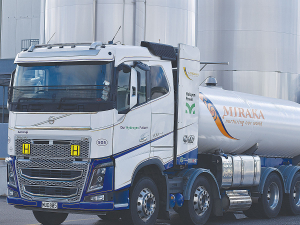Record final milk price for Miraka suppliers
Farmers supplying milk to Taupo-based processor Miraka are getting a 2024-25 season base milk price of $10.16/kgMS.
 Last September, Miraka launched New Zealand’s first green hydrogen dual fuel powered milk collection tanker.
Last September, Miraka launched New Zealand’s first green hydrogen dual fuel powered milk collection tanker.
Taupo-based low-carbon dairy company Miraka has its sights set on using 100% renewable energy in the next decade.
The dairy processor, New Zealand's second largest Māori-owned global export company, was the world's first company to use renewable geothermal energy in dairy processing.
Chief executive Karl Gradon says Miraka has always set lofty goals, and has set its sights on being fully powered by renewable energy in line with its core value, kaitiakitanga - caring for the natural environment and resources.
"We aspire to be 100% powered by renewable energy come 2030. Ninety three percent of our current energy already comes from renewable energy sources such as geothermal, so we are already most of the way there," he says.
Last September, Miraka launched New Zealand's first green hydrogen dual fuel powered milk collection tanker.
The 700 horsepower Volvo hydrogen-diesel tanker reduces on road carbon emissions by 35% per tanker which is the equivalent carbon reduction benefit of planting 1,600 trees annually.
"We've embraced innovation, another of our core values, to introduce green hydrogen into our operations and supply chain," says Gradon.
"This move has taken us a major step closer toward our aspirations of being fully powered by renewable energy. Any initiative which removes carbon emissions from the atmosphere is a good initiative."
The hydrogen is produced by Halcyon Power, a joint-venture of Obayashi Corporation of Japan and Tūaropaki Trust, a foundational shareholder in Miraka with its roots in the settlement of Mokai, 30km northwest of Taupō. The hydrogen plant is nearby to the Miraka dairy plant which also calls Mokai home.
The geothermal steam power which Miraka uses is also owned by Tūaropaki Trust. The steam is piped across the road from the Mokai Power Station to the Miraka plant. The remaining power goes to the national grid.
It is well known that in the dairy manufacturing process, spray drying - the process of removing water from milk to make powder - is hugely energy intensive, requiring vast amounts of power.
Miraka's use of renewable energy sources is world-leading and underpins the company's sustainability credentials. Miraka is a Certified B Corporation and Toitū carbon reduced certified - the globally recognised certifications endorsing the company's commitment to sustainability and social impact.
Dairy Women's Network (DWN) has announced that Taranaki dairy farmer Nicola Bryant will join its Trust Board as an Associate Trustee.
Rural Women New Zealand (RWNZ) says it welcomes the release of a new report into pay equity.
Red meat exports to key quota markets enjoyed $1.4 billion in tariff savings in the 2024-25 financial year.
Remediation NZ (RNZ) has been fined more than $71,000 for discharging offensive odours described by neighbours as smelling like ‘faecal and pig effluent’ from its compositing site near Uruti in North Taranaki.
Two kiwifruit orchards in the Bay of Plenty and one in Northland are this year's finalists for the Ahuwhenua Trophy competition.
The Government's chief science advisor, Dr John Roche says the key objective for the science sector in the coming year is bedding down the reforms which sees the merger of the previous entities.